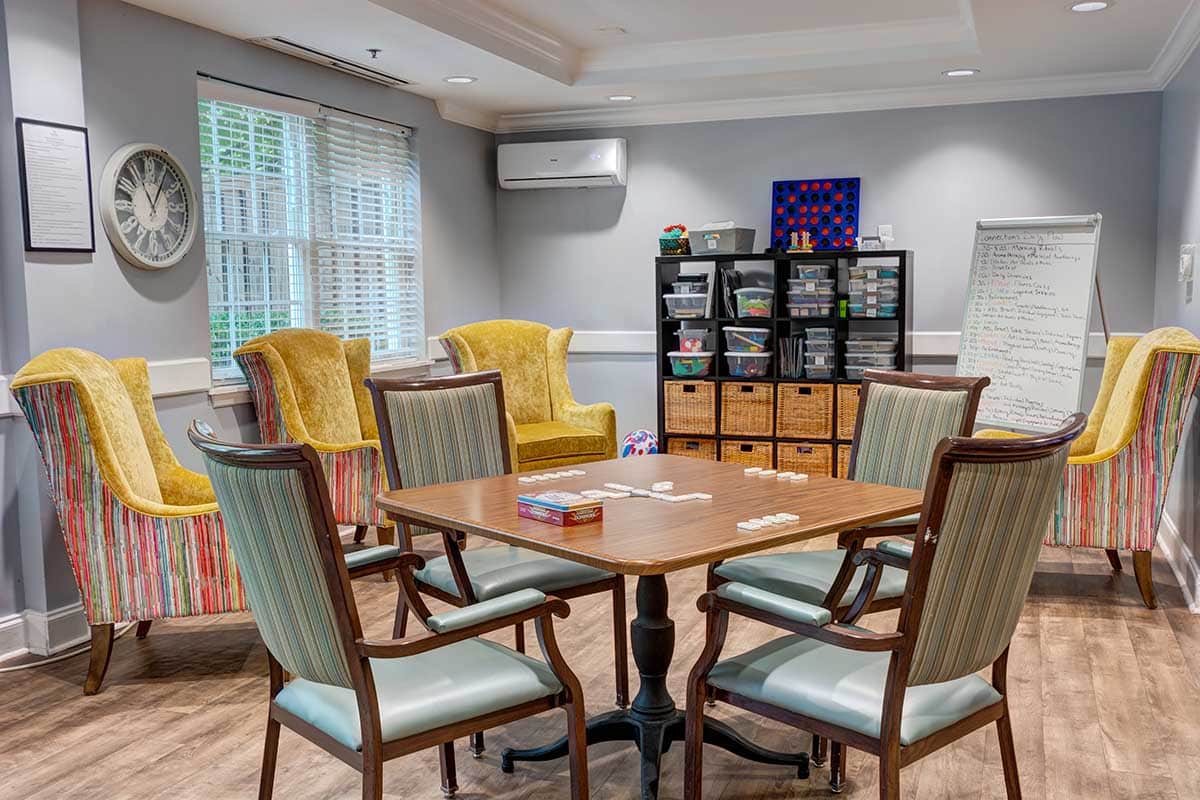All Concerning Memory Treatment Providers: Why Little Memory Care Homes Are a Great Selection
Memory care solutions play a vital function in supporting individuals with Alzheimer's and dementia. Tiny memory care homes attract attention for their customized approach and intimate setup. With lower staff-to-resident proportions, these homes promote stronger links and customized treatment. Locals take advantage of improved social interactions and a risk-free setting. As households check out choices, understanding the unique benefits of small memory treatment homes becomes crucial. What variables should be taken into consideration when selecting the appropriate home?
Understanding Memory Treatment Services
While lots of might know with general elderly treatment alternatives, understanding memory care solutions is important for families encountering the challenges of cognitive decrease. Memory care especially deals with individuals with problems such as Alzheimer's illness and other kinds of dementia. These services give a structured setting that concentrates on boosting the lifestyle for homeowners via specialized treatment and support.Memory care centers are designed to ensure safety and safety, frequently including safeguarded atmospheres to avoid wandering. Educated team member are readily available around the clock to aid with everyday activities, drug monitoring, and individual treatment. Additionally, memory treatment programs frequently consist of cognitive excitement activities, customized to engage locals and advertise mental well-being. Households can profit from recognizing these services, as they allow notified choices concerning their liked ones' care, ensuring that their details requirements and choices are dealt with in a caring and encouraging fashion.
The Advantages of Little Memory Treatment Residences
Tiny memory care homes use unique advantages that can significantly improve the lifestyle for citizens with cognitive impairments. One substantial benefit is the intimate setting, which enables customized interactions among personnel and homeowners. This smaller sized setting cultivates purposeful connections, minimizing feelings of seclusion and anxiousness often experienced by individuals with memory issues.Additionally, the lower staff-to-resident proportion in small memory care homes allows caretakers to supply even more alert guidance and support. This approach not only boosts safety and security yet additionally advertises a feeling of safety and security for the residents.Moreover, little memory treatment homes can adjust quickly to the special demands and preferences of each resident, permitting a much more homelike ambience. Such a setting can motivate social engagement and participation in tasks, inevitably improving the day-to-day experiences of those living with cognitive impairments.
Personalized Care Plans for Residents
Customized care strategies are important in memory treatment homes, as they deal with the one-of-a-kind demands and choices of each resident. These plans start with complete evaluations performed by skilled specialists, who examine cognitive capacities, case history, and individual interests. This customized approach warranties that care is not only reliable however additionally considerate of each person's self-respect and autonomy.Moreover, individualized care plans are flexible, enabling modifications as residents' demands develop in time. This adaptability fosters a sense of protection and knowledge, which is necessary for individuals living with memory difficulties. Caretakers are trained to execute these plans continually, providing assistance that straightens with the residents' regimens and preferences.Ultimately, customized care strategies enhance the top quality of life for citizens by advertising engagement, wellness, and independence, making them a basic aspect of memory treatment services in small memory care homes.
Developing a Home-Like Atmosphere
Developing a home-like environment is critical for fostering convenience and experience in memory treatment setups, as it significantly impacts residents' emotional health. Little memory treatment homes typically focus on personalized touches, such as cozy color combinations, family members photos, and acquainted furnishings arrangements, which assist residents feel more at simplicity. Including aspects similar to a typical home, like cozy space and common areas, urges a sense of belonging.Moreover, making use of natural light and exterior spaces can boost the ambience, advertising relaxation and serenity. Personnel play a substantial function in keeping this atmosphere by involving with locals in a thoughtful way, treating them like household. Regular tasks, such as food preparation or horticulture, can also add to a home-like feel, providing opportunities for homeowners to join significant experiences. Overall, developing a nurturing atmosphere sustains cognitive feature and emotional security, making it a vital facet of memory treatment solutions.
Enhanced Social Communication and Area
Boosted social interaction and community are important components of memory treatment solutions. By fostering individualized social involvement and developing a family-like atmosphere, these services promote purposeful links among locals. Group tasks and events even more encourage involvement, assisting individuals really feel much more included and sustained.
Individualized Social Involvement
While social communication is vital for overall well-being, several individuals with memory disabilities usually struggle to involve meaningfully with others. Individualized social interaction in memory treatment homes addresses this challenge by developing tailored activities that accommodate citizens' one-of-a-kind rate of interests and capacities. By concentrating on private preferences, caregivers can cultivate connections that reverberate deeply with everyone. Tasks such as art treatment, songs sessions, and guided discussions advertise cognitive stimulation and psychological expression. Additionally, tiny team settings motivate camaraderie and allow for more intimate interactions, improving sensations of belonging. This approach not just battles feelings of seclusion but likewise empowers citizens to preserve a sense of identification, eventually adding to enhanced mental wellness and lifestyle.
Family-like Ambience
In a memory treatment setup, fostering a family-like environment significantly improves social communication and builds a sense of area among residents. Smaller memory treatment homes typically focus on intimate settings, enabling homeowners to form closer connections with each other and employee. This nurturing ambience advertises count on, which is vital for individuals with memory problems. Homeowners are extra most likely to involve in discussions and share experiences, creating a helpful network that minimizes sensations of solitude. The knowledge of common areas and click here for more regimens adds to a sense of belonging, additionally motivating social interaction (personalized memory care). In such setups, emotional bonds prosper, leading to boosted total well-being and a greater top quality of life for homeowners as they navigate their everyday experiences together
Team Activities and Events

Safety and Safety Features in Small Houses
Many small homes developed for memory care incorporate necessary safety and security functions to assure the well-being of homeowners. These homes often utilize safe and secure entrance and exit indicate prevent wandering, a typical problem amongst individuals with memory impairments. Additionally, monitoring systems and alarm system mechanisms improve monitoring, ensuring that team can quickly react to any kind of unusual activities.Interior designs are tailored for safety and security, with lessened threats such as sharp corners and clutter-free paths. Handrails and non-slip flooring are generally set up to lower the risk of drops. Personnel are educated in emergency situation procedures, ensuring they are prepared for different situations.Moreover, personalized care strategies might include analysis of individual safety and security demands, giving tailored options for each resident. On the whole, these safety and security and security features create a caring setting where residents can thrive while preserving their dignity and self-reliance.
How to Pick the Right Memory Treatment Home
Just how can families ensure they choose the most appropriate memory care home for their liked ones? The decision needs mindful consideration of a number of elements. Households need to assess the facility's team certifications and training, making certain official source that caretakers are experienced in managing memory-related conditions. Next off, it's essential to analyze the home's setting, concentrating on safety functions and whether it fosters a sense of neighborhood and belonging. Checking out the facility can offer understanding into day-to-day tasks and the social atmosphere, which are important for mental stimulation and psychological wellness. Additionally, family members need to inquire about the care strategies offered, guaranteeing they are tailored to individual demands. Considering the home's location and accessibility for family members sees can contribute to a smoother shift. By dealing with these facets, families can make an informed decision that prioritizes their loved one's comfort and high quality of life in a memory care setting.
Regularly Asked Questions
What Certifications Should Staff Members in Memory Care Residences Have?
Personnel members in memory care homes ought to have relevant certifications, experience in dementia treatment, solid communication skills, and compassion. Ongoing training in behavioral administration and healing interventions enhances their ability to sustain residents successfully.
Just How Do Memory Treatment Provider Differ From Conventional Assisted Living?
Memory treatment services concentrate especially on people with memory problems, offering specific support and structured atmospheres. On the other hand, conventional assisted living uses general aid with everyday activities, doing not have the customized approach needed for those with cognitive difficulties.
What Kinds of Tasks Are Supplied in Memory Treatment Houses?
Memory care homes commonly provide a range of tasks created to involve locals. Usual alternatives include art therapy, songs sessions, cognitive games, exercises, horticulture, and gatherings, all focused on improving wellness and cognitive feature.
Can Citizens Bring Their Own Items to Memory Treatment Houses?
Homeowners can typically bring their very own valuables to memory care homes, permitting them to personalize their home - personalized memory care. This practice aids produce an acquainted environment, advertising comfort and a feeling of identity for the individuals

Exactly How Are Member Of The Family Included in the Care Process?
Relative play a crucial function in the treatment process, typically joining decision-making, going to care conferences, and supplying psychological assistance. Their participation cultivates a joint setting, improving the resident's general health and high quality of life. While several may be familiar with general elderly treatment alternatives, recognizing memory treatment solutions is crucial for family members encountering the challenges of cognitive decrease. These solutions provide an organized setting that focuses on boosting the high quality of life for residents with specialized treatment and support.Memory treatment facilities are developed to ensure security and protection, usually including secured environments to prevent roaming. Customized treatment strategies are vital in memory care homes, as they provide to the unique needs and preferences of each citizen. Team participants in memory care homes need to have pertinent certifications, experience in mental deterioration care, solid interaction skills, and compassion. Memory care services focus particularly on individuals with memory impairments, supplying customized assistance and structured atmospheres.